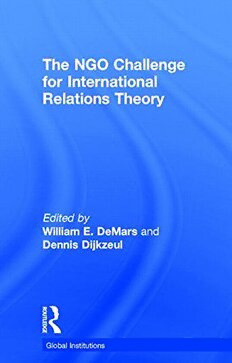Table Of ContentNGOs have been challenging international relations theory for some
time, and this essential volume clearlyarticulates the manyways it has.
More importantly, it also charts a path for future theorizing.
Michael Barnett, University Professor of International Affairs and
Political Science, George Washington University
ThisnewvolumeonNGOsprovidesarootandbranchcritiqueofhow
all the major IR theories overlook the politics of NGOs. Redeploying
core themes of power and practice, it provides an in-depth under-
standing of the global order, locating the ‘bridging’ role that NGOs
play for many issues and across many societies. The chapters offer new
insights into the strategies and impacts of NGOs in international
affairs, and the conclusion synthesizes the various ways in which
NGOs force radical reorientations of IR theory. This book should be
read by any student or scholar of international relations.
Anthony F. Lang, Jr., Chair in International Political Theory
and Director of the Centre for Global Constitutionalism,
University of St Andrews
This page intentionally left blank
The NGO Challenge
for International
Relations Theory
It has become commonplace to observe the growing pervasiveness and
impact of Non-Governmental Organizations (NGOs). And yet the
three central approaches in International Relations (IR) theory, Liber-
alism, Realism,andConstructivism,overlookorignoretheimportance
of NGOs, both theoretically and politically.
Offering a timely reappraisal of NGOs, and a parallel reappraisal of
theory in IR, this book uses practice theory, global governance, and
new institutionalism to theorize NGO accountability and analyze the
history of NGOs. This study uses evidence from empirical data from
Europe, Africa, Latin America, the Middle East and Asia and from
studiesthatrangeacrosstheissuesofpeacebuilding,ethnicreconciliation,
and labor rights to show IR theory has often prejudged and misread
the agency of NGOs.
Drawingtogetheragroupofleadinginternationalrelationstheorists,
this book explores the frontiers of new research on the role of such
forces in world politics and is required reading for students, NGO
activists, and policy-makers.
WilliamE.DeMarsisProfessorandChair,DepartmentofGovernment,
WoffordCollege,USA.
Dennis Dijkzeul is the Research Coordinator of the Institute of Inter-
national Law of Peace and Armed Conflict and Professor of Conflict
and Organization Research at Ruhr University Bochum, Germany.
Global Institutions
Edited by Thomas G. Weiss
The CUNY Graduate Center, New York, USA
and Rorden Wilkinson
University of Sussex, Brighton, UK
About the series
The “Global Institutions Series” provides cutting-edge books about
many aspects of what we know as “global governance.” It emerges
from our shared frustrations with the state of available knowledge—
electronic and print-wise, for research and teaching—in the area. The
series is designed as a resource for those interested in exploring issues
of international organization and global governance. And since the
first volumes appeared in 2005, we have taken significant strides
toward filling conceptual gaps.
The series consists of three related “streams” distinguished by their
blue,red,andgreencovers.Thebluevolumes,comprisingthemajorityof
thebooksintheseries,provideuser-friendlyandshort(usuallynomore
than50,000words)butauthoritativeguides to major global and regio-
nal organizations,aswellaskeyissuesintheglobalgovernanceofsecur-
ity, the environment, human rights, poverty, and humanitarian action
amongothers.Thebookswith red covers are designed to present origi-
nal research and serve as extended and more specialized treatments of
issues pertinent for advancing understanding about global governance.
Andthevolumeswithgreencovers—themostrecentdepartureintheseries
—are comprehensive and accessible accounts of the major theoretical
approachestoglobalgovernanceandinternationalorganization.
The books in each of the streams are written by experts in the field,
ranging from the most senior and respected authors to first-rate scho-
lars at the beginning of their careers. In combination, the three com-
ponents of the series—blue, red, and green—serve as key resources for
faculty, students, and practitioners alike. The works in the blue and
green streams have value as core and complementary readings in
courses on, among other things, international organization, global
governance, international law, international relations, and international
politicaleconomy;theredvolumesallowfurtherreflectionandinvestigation
intheseandrelatedareas.
The books in the series also provide a segue to the foundation
volume that offers the most comprehensive textbook treatment avail-
able dealing with all the major issues, approaches, institutions, and
actors in contemporary global governance—our edited work Interna-
tional Organization and Global Governance (2014)—avolume to which
manyof the authors in the series have contributed essays.
Understanding global governance—past, present, and future—is far
from a finished journey. The books in this series nonetheless represent
significant steps toward a better way of conceiving contemporary pro-
blems and issues as well as, hopefully, doing something to improve
world order. We value the feedback from our readers and their role in
helping shape the on-going development of the series.
A complete list of titles appears at the end of this book. The most
recent titles in the series are:
21st Century Democracy Promotion in the Americas (2014)
by Jorge Heine and Brigitte Weiffen
BRICS and Coexistence (2014)
edited by Cedric de Coning, Thomas Mandrup, and Liselotte Odgaard
IBSA (2014)
by Oliver Stuenkel
Making Global Institutions Work (2014)
edited by Kate Brennan
Post-2015 UN Development (2014)
edited by Stephen Browne and Thomas G. Weiss
Who Participates in Global Governance? (2014)
by Molly Ruhlman
The Security Council as Global Legislator (2014)
edited by Vesselin Popovski and Trudy Fraser
This page intentionally left blank
The NGO Challenge
for International
Relations Theory
Edited by
William E. DeMars and
Dennis Dijkzeul
AddAddAddAdd AAAdddddAdAdAddddAddd
AddAdd AdAddd
Firstpublished2015
byRoutledge
2ParkSquare,MiltonPark,Abingdon,OxonOX144RN
andbyRoutledge
711ThirdAvenue,NewYork,NY10017
RoutledgeisanimprintoftheTaylor&FrancisGroup,aninforma
business
©2015WilliamE.DeMarsandDennisDijkzeulforselectionand
editorialmatter;individualcontributorsfortheircontributions.
TherightofWilliamE.DeMarsandDennisDijkzeultobe
identifiedaseditorsofthisworkhasbeenassertedbythemin
accordancewiththeCopyright,DesignsandPatentAct1988.
Allrightsreserved.Nopartofthisbookmaybereprintedor
reproducedorutilizedinanyformorbyanyelectronic,mechanical,
orothermeans,nowknownorhereafterinvented,including
photocopyingandrecording,orinanyinformationstorageor
retrievalsystem,withoutpermissioninwritingfromthepublishers.
Trademarknotice:Productorcorporatenamesmaybetrademarks
orregisteredtrademarks,andareusedonlyforidentificationand
explanationwithoutintenttoinfringe.
BritishLibraryCataloguinginPublicationData
AcataloguerecordforthisbookisavailablefromtheBritish
Library
LibraryofCongressCataloginginPublicationData
TheNGOchallengeforinternationalrelationstheory/editedby
WilliamDeMarsandDennisDijkzeul.
pagescm.–(Routledgeglobalinstitutionsseries;92)
Includesbibliographicalreferencesandindex.
1.Non-governmentalorganizations.2.Internationalrelations–
Philosophy.I.DeMars,WilliamE.(WilliamEmile),1953-editorof
compilation.II.Dijkzeul,Dennis,editorofcompilation.
JZ4841.N3472015
327.101–dc23
2014031081
ISBN:978-1-138-84529-9(hbk)
ISBN:978-1-138-84530-5(pbk)
ISBN:978-1-315-72815-5(ebk)
TypesetinTimesNewRoman
byTaylor&FrancisBooks
Contents
List of illustrations xi
List of contributors xiii
Acknowledgments xvi
Abbreviations xviii
PARTI
Introduction 1
Introduction: NGOing 3
WILLIAME.DEMARSANDDENNISDIJKZEUL
PARTII
Theory 39
1 How to study NGOs in practice:
a relational primer 41
MORTENSKUMSRUDANDERSEN
2 Global governance and NGOs: reconceptualizing
international relations for the twenty-first century 65
KARENA.MINGSTANDJAMESP.MULDOONJR.
3 Network institutionalism: a new synthesis for
NGO studies 82
ANNAOHANYAN

